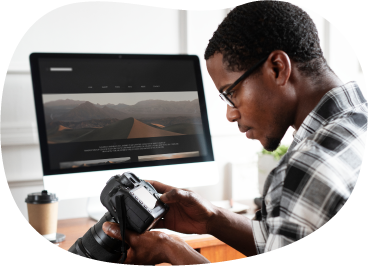

General liability insurance for photographers and videographers
General liability insurance covers common business risks like customer injuries, customer property damage, and advertising injuries. It protects your small photography or videography business from the high costs of lawsuits and helps you qualify for leases and contracts.
General liability insurance covers common risks
Whether it’s part of your photography business insurance or film production insurance, general liability insurance coverage protects against common third-party business risks. It can pay for medical bills if a customer is injured at your studio, or if your photography drone crashes and damages someone's property.
If you decide to rent a studio, most landlords will require you to carry this policy in order to sign a commercial lease. You also might need this coverage to conduct a photo shoot at a wedding venue or to film in a public park that requires a permit.
This policy provides liability coverage related to:
- Customer injuries
- Customer property damage
- Advertising injuries
Bundle policies to save money and increase security
If you run a small photography or production studio, you may be able to bundle general liability insurance with commercial property insurance in a business owner’s policy (BOP). A BOP typically costs less than purchasing each policy separately.
Businesses that are eligible for BOPs usually:
- Have fewer than 100 employees
- Have a small office or workplace
- Make less than $1 million in annual revenue
- Operate in a low-risk industry, such as photography or videography
- Need less than 12 months of business interruption insurance

What coverage can general liability provide for photo and video companies?
General liability insurance can protect your photography or videography company from common third-party business risks, including:
Third-party injuries
If a model or actor is injured by a lighting stand that tips over during a photo shoot, or a delivery person slips and falls at your studio, you might be held responsible for the bodily injury. If the person sues, you may need to pay for their medical expenses – plus the cost of hiring a lawyer. General liability insurance covers:
- Medical bills
- Attorney's fees
- Judgments or settlements
- Funeral expenses in fatal incidents
Note that this policy does not cover employee injuries. For that, you’ll need workers’ compensation insurance.
Customer property damage
Photographers and videographers frequently work on location, which means taking on additional risks. If you accidentally break a client’s business equipment or damage property at a wedding venue, your general liability policy would help cover repairs or replacement costs of the damaged equipment. It can also cover legal bills if someone sues over property damage.
General liability coverage can protect your business from incidents that occur at your office, too. For example, if you accidentally spill coffee on a customer’s laptop, your general liability policy should cover the cost of a replacement computer.
Advertising injuries
While advertising your company and its services, it’s possible to inadvertently copy another videographer’s slogan or mimic a rival professional photographer's advertising campaign. Accidental advertising injuries are covered by general liability insurance, including:
- Defamation, both libel (written) and slander (spoken)
- Copyright infringement
If you use advertising or promotional materials to attract clients to your photography or videography business, you’ll want to make sure your insurance includes this protection.
How much does general liability insurance for photo and video businesses cost?

Photo and video businesses pay an average of $29 per month for general liability insurance, but you could pay more or less depending on your risks.
Photographer insurance costs are based on a few factors, including:
- Types of photo and video services offered
- Value of business property, such as photography equipment, editing and lighting equipment, etc.
- Annual business revenue
- Where your business operates
- Number of employees
- Coverage limits, deductible, and number of additional insureds
Other important insurance policies to consider
While general liability insurance covers many risks inherent to the photo and video industry, it does not provide complete protection. Small business owners looking for photographer insurance should also consider:
- Business owner’s policy (BOP): A BOP offers protection against the most common risks in the photo and video industry. It bundles general liability with commercial property insurance at a lower rate than purchasing both policies separately. If a client is injured at your office or a thief steals your camera equipment, your BOP can cover the costs.
- Professional liability insurance: Also called errors and omissions (E&O) insurance, this policy provides critical coverage for lawsuits related to your work performance. If a wedding videographer misses the bride and groom’s first kiss, or a photographer accidentally deletes the images from a catalog shoot, professional liability insurance can pay for your legal expenses.
- Workers’ compensation insurance: This policy can pay for medical expenses if an employee is injured on the job. For example, if an assistant photographer twists an ankle while on a shoot, or a grip hurts their back while loading equipment, workers’ comp can pay for their medical bills, as well as disability benefits. Most states require this coverage for businesses with employees.
- Commercial auto insurance: Photo and video businesses that own a vehicle typically must carry commercial auto insurance to comply with state laws. This coverage helps you recover financially from accidents involving your business vehicle.
- Equipment insurance: A standard commercial property policy covers business property at your company location, which is why photo and video professionals often invest in equipment insurance, or inland marine insurance. This policy provides equipment coverage for your cameras and other property wherever you take it.
Get free quotes and buy online with Insureon
Are you ready to safeguard your photography or videography business with general liability insurance? Complete Insureon’s easy online application to get quotes from top U.S. insurance companies.
You can also speak with a licensed insurance agent to help you find the right insurance for your business needs. Once you find the best, most affordable coverage, you can begin your policy and get a certificate of insurance in less than 24 hours.
Verified general liability coverage reviews

Want free expert advice right in your inbox?
By entering your email address and subscribing, you agree to our Terms of Use and Privacy Policy




